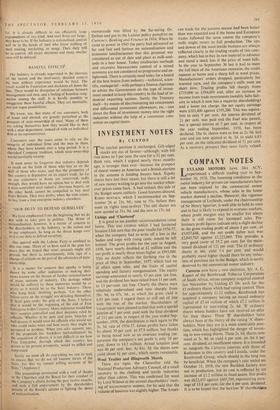INVESTMENT NOTES
By CUSTOS
rr HE market position is unchanged. Gilt-edged 1 stocks are out of favour-although, with bill rate down to 3 per cent. the case for a 34 per cent. Bank rate, which I argued nearly three months ago, is stronger than ever-because the prospect of dearer money in America and a British election in the autumn is holding buyers back. Equity shares here lost their steam, but there is still a lot of new money waiting to go into the market when- ever prices come back. A bad setback this side of the Budget seems unlikely. Good features abound. RADIO RENTALS, which I recommended on Sep- tember 26 at 23s. 9d., rose to 35s. before they went ex rights (one-in-fivel. The old shares are now quoted at 31s. 9d. and the new at 17s. 6d. Liebigs and 'Chartered' rr HE market position is unchanged. Gilt-edged 1 stocks are out of favour-although, with bill rate down to 3 per cent. the case for a 34 per cent. Bank rate, which I argued nearly three months ago, is stronger than ever-because the prospect of dearer money in America and a British election in the autumn is holding buyers back. Equity shares here lost their steam, but there is still a lot of new money waiting to go into the market when- ever prices come back. A bad setback this side of the Budget seems unlikely. Good features abound. RADIO RENTALS, which I recommended on Sep- tember 26 at 23s. 9d., rose to 35s. before they went ex rights (one-in-fivel. The old shares are now quoted at 31s. 9d. and the new at 17s. 6d. Liebigs and 'Chartered' It is good to see another recommendation come home. This was LIEBIGS which 1 had favoured because I felt sure that the poor results for 1956-57, when the company had to.write off a loss in the Sudan and cope with rising costs, would be left behind. The gross profits for the year to August, 1958, have nearly doubled at £2 million and the net profit is nearly three times higher at £993,000. This no doubt reflects the farthing rise in the price of Oxo in September, 1957. which had no ill effect upon sales, and the fruits of capital spending and factory reorganisation. The equity earnings amounted to nearly 43 per cent, tax free, and the dividend has been raised from 11 per cent. to 13 'per-cent. tax free. Clearly the shares were relatively undervalued and rose sharply from 58s. 9d. to 67s. 9d., at which the gross yield is 6.65 per cent. I regard them as still out of line with the rest of the market. Shareholders of 'CHARTERED' were pleased to find that with a special interim of 5 per cent. paid with the final dividend of 21.} per cent. in respect of the year ended Sep- tember, 1958, the distribution is back again to the 5s. 3d. rate of 1956-57. Gross profits have fallen by about 30 per cent. to £7.9 million, but thanks to being taxed now as an overseas trading cor- poration the company's net profit is only 10 per cent. down to £4.3 million. Actual taxation paid was 40 per cent. less. At 81s. 3d. the shares now yield about 6 per cent., which seems reasonable. Wool Textiles and Illingworth Morris There are signs, the Chancellor told the National Production Advisory Council, of a small recovery in the clothing and textile industries other than cotton. This was confirmed for wool by Lord Wilmot at the annual shareholders' meet- ing of ILLINGWORTII MORRIS, for he said that the volume of business was slightly higher. The Ameri- can trade for the autumn season had been better than was expected and if the home and European trades followed the same course the company's. mills might revert to full production. The ups. and downs of the wool textile business are always. reflected clearly in the trading results of this com- pany, which has to buy its raw material in advance and stand a stock loss if the price of wool falls.. In the year to September 30 last it had to meet the full blast of the American recession, the credit squeeze at home and a sharp fall in wool prices. Manufacturers' orders dropped, particularly for worsted yarn, and the company's mills went ore short time. Trading profits fell sharply front £719,000 to £394,000 and, after an increase in income from trade investments (notably Salts Salt- aire in which it now has a majority shareholding) and a lower tax charge, the net equity earnings. were £103,400 against £195,200. This was equiva- lent to only 9 per cent. An interim dividend of 2f per cent. was paid and the final was passed- but a special interim of 5 per cent, in respect of the year ending September, 1959, has been declared. The 4s. shares were as low as 2s. 9d. last year and are now quoted at 4s. 3d. to yield 6.85, per cent. on the indicated dividend of 7-1 per cent.. As a recovery prospect they seem fairly valued..






































 Previous page
Previous page